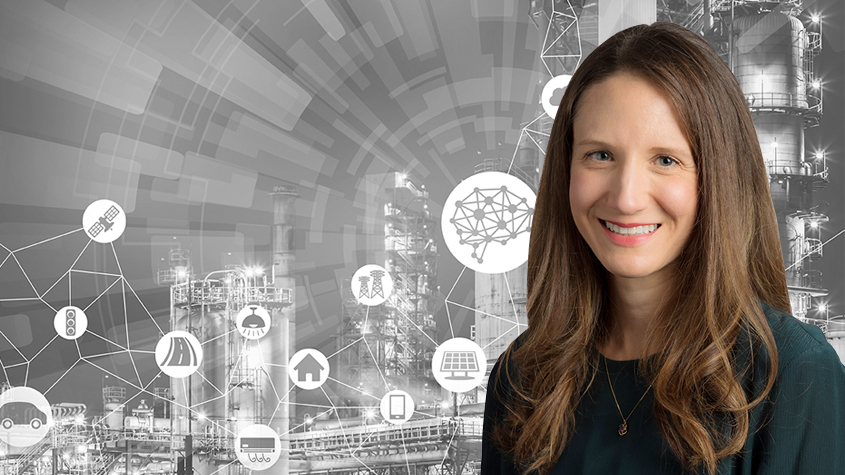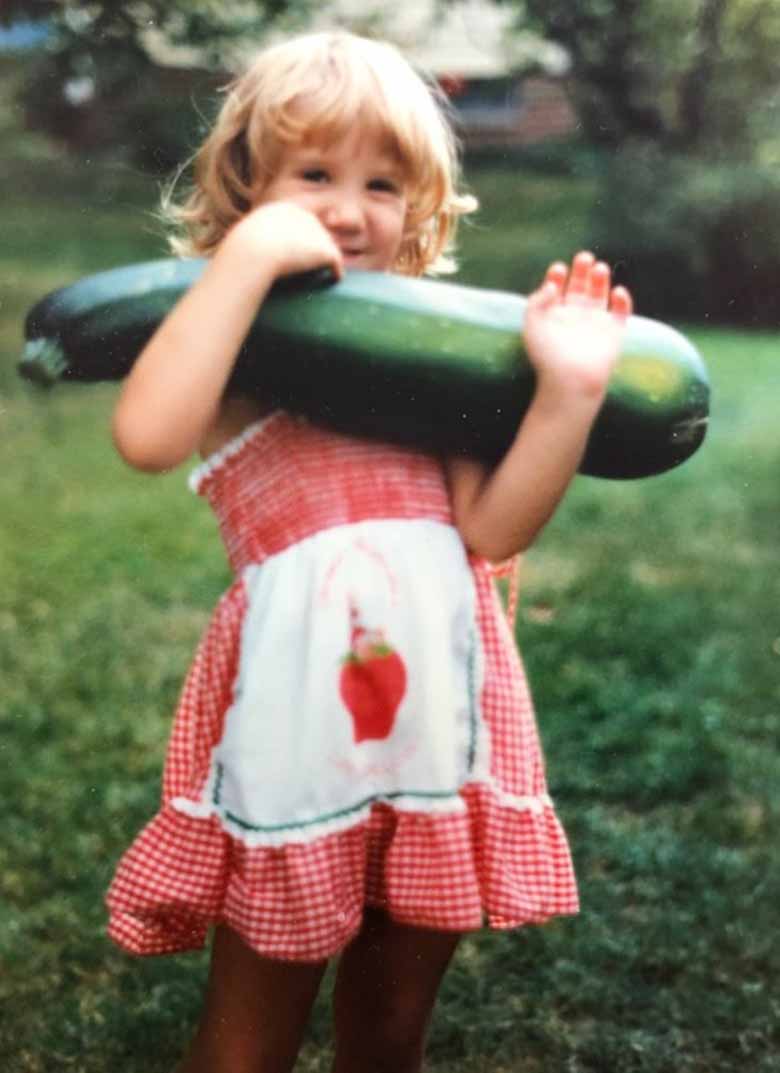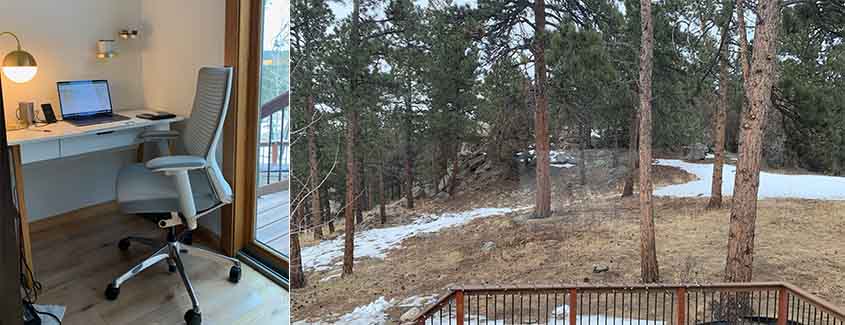Q&A With Meredith Doyle: Impatient To Save the World
Manufacturing Mastermind Series

Much to the annoyance of her physicist father, Meredith Doyle chose to study chemistry.
She chose that field, in part, to follow her own path, but also because chemistry builds everything in the world. And more than anything, Doyle wants to change the world as quickly as humanly possible. It is not surprising, then, that she is working on one of the biggest, most urgent global challenges—one that has infiltrated landfills, oceans, rain water, and fish worldwide: plastics waste.
“I wanted to work on something big, something that will help the world, and help people,” said Doyle, now a materials chemist who joined the National Renewable Energy Laboratory (NREL) in February 2021. She is also a project manager and chief operating officer of the Bio-Optimized Technologies to keep Thermoplastics out of Landfills and the Environment (BOTTLE™) consortium, which is funded by the U.S. Department of Energy’s Advanced Manufacturing Office and Bioenergy Technologies Office, and aims to design more recyclable plastics and reduce plastics waste by developing new ways of recycling these materials.
Doyle manages an interdisciplinary team of more than 100 researchers from national laboratories, academia, and industry to invent solutions to break down or recycle plastics (with plastic-eating microbes, for example) and transform energy-intensive plastics manufacturing, too.
In a recent interview, Doyle shared how she went from lab bench to leader and discussed her perspectives on the future potential for plant-based plastics, issues surrounding plastics pollution, and more. This interview was edited for clarity and length.
As an undergraduate student at Ohio University, you studied chemistry. But later, as a doctoral student at the University of California, Berkeley, you started drifting away from basic science. What happened?
As an undergraduate, I loved the fundamental science taught in chemistry. But in graduate school, I started to feel the desire to do research tied to solving real-world challenges. It was difficult to connect my research to tangible products that would have real-world applicability. That's what led me to the manufacturing industry. I wanted to make sure that whatever I was doing, I could see it out in the world.
So, immediately after graduation, you headed to 3M, an international technology corporation that manufactures industrial, safety, and consumer products. Did you find what you were looking for?
As a senior researcher in the inorganics and ceramics group at 3M, I got to see a water filtration material technology I developed become a commercial product. It was very exciting to see it out in the world. But it still took a long time. Ultimately, that’s what led me to management. I wanted to help speed up the commercialization process and remove barriers to getting science discoveries out in the real world.

Right. So, you shifted into strategic management roles where you could help speed up processes and shrink the window from idea to commercial product. But why did you choose to leave 3M and join NREL?
I was interested in sustainability. It's funny because a lot of what we did at 3M was make polymers [the fundamental components of plastics], and this job is about dealing with polymer waste. So, it's kind of like coming full circle, shifting from a polymer production company to a polymer recycling project.
What’s something most people might not know about plastics?
Plastics are not only causing waste problems; they’re also an energy problem because polymers are made from fossil fuels. Right now, about 8% of global oil consumption goes towards making plastics, and it's projected to go up to 20% by 2030. Some of that is because we're using less fossil fuel for things like transportation (because of electrification of vehicles), but it's because plastics production is increasing, too.
What would you say to the public to get them to care about plastics waste and pollution?
Plastics have revolutionized our society. We've been able to save food from going to landfills by using single-use plastics. Some medical discoveries never would have happened without plastics. It's not all bad, but today, plastics manufacturing is depleting our fossil fuel resources and producing greenhouse gas emissions. And right now, especially when you use something once and then throw it away, you know where it’s going. It’s piling up. You hear about masses of plastics sitting in the middle of the Pacific Ocean. Plastics deposits have been detected in pristine areas of the Rocky Mountains. Plastics can be found everywhere we look.
Even in the fish we eat, right?
Right. Researchers are finding large amounts of plastics in fish populations, likely due to the dumping of plastics in our oceans.
So, tell me about BOTTLE. What solutions are you working on now?
We have three main research areas. The first is deconstruction of plastics waste—finding ways to chemically and biologically deconstruct plastics. Since BOTTLE began a little over a year ago, we have spent the most time working on this area because the world literally has mountains of plastics waste to deal with. The second one is upcycling—taking plastic waste byproducts and converting them into something else of a higher value, often with help from microbes.
The third is redesign—completely changing how we think about plastics production in the world. Maybe we can come up with new ways to make plastics from biobased sources, like cellulose or lignin from plants, instead of fossil fuels and design them to be easier to recycle, too.
What excites you most about BOTTLE?
BOTTLE is using advanced chemistry guided by analysis to holistically look at this problem and come up with new ways to recycle plastics waste for a circular economy. I really do think we're going to help change the world. It makes me want to get out of bed and do the work!
As BOTTLE’s chief operating officer, what do you do?
We're funded by DOE, but we also have additional projects funded by the manufacturing industry, so a lot of my work is trying to connect with companies to make sure we can tie our technology within BOTTLE to problems in the real world. I also make sure we hit our milestones, hire the right people, ensure everyone's voices are heard, and analyze our portfolio to guarantee we are working on the projects that will be the most impactful.
Are there any challenges you’re still figuring out how to overcome?
We want to solve this huge problem, but sometimes knowing what to focus on can be a bit challenging: Do you focus on the big problem? Or do you focus on something we can solve quickly but may not be as impactful? There is so much we need to accomplish!

So, what now? What are the immediate next steps to start solving this problem? What roadblocks might get in the way?
We need the right manufacturing capabilities to enable recycling and have companies commit to develop new types of plastics and deconstruct current plastics. Right now, making plastics is cheap and easy. Making it from recycled materials takes more work. We can put out the technology, but NREL can't make companies use it. So, how do we incentivize this?
Plastics pollution can be an issue, too, right?
Yes. Plastics waste disproportionately affects populations along the coastline and where recycling isn’t as well established. Many coastal communities don't have the time and money to clean up plastics waste. It can be quite a challenge when it's quite literally dumped on developing nations.
You’re also invested in fostering science, technology, engineering, and mathematics students. Can you talk about that?
To solve these tough problems, we need a variety of scientific backgrounds as well as people and cultures. Without this, it's difficult to solve complex challenges and enable the adoption of new solutions.
It's also important to raise leaders in the sciences and make sure our next generation is well set up to tackle our huge environmental challenges. The best and the brightest aren't always going into science. Maybe it doesn’t seem like a flashy job, but it's a really cool career path. You get to work on real problems and try to do something that will make a difference.
Interested in building a clean energy future? Read other Q&As from NREL researchers in Advanced Manufacturing, and browse open positions to see what it is like to work at NREL.
Last Updated May 28, 2025
